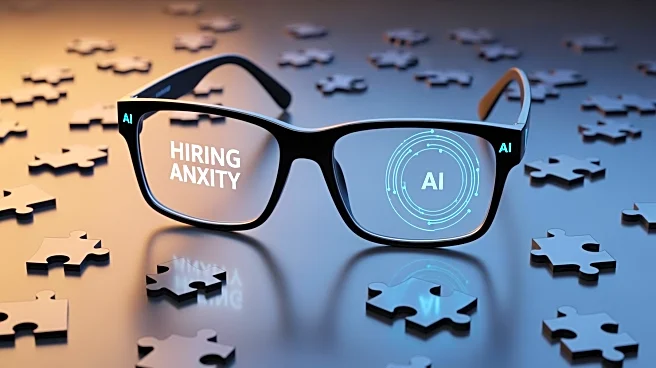What's Happening?
During Meta's Q2 2025 earnings call, CEO Mark Zuckerberg stated that individuals without AI-enabled glasses could face a 'significant cognitive disadvantage' compared to those who have them. This remark
has stirred discussions about the future of wearable AI technology and its implications for hiring practices. The statement coincided with EssilorLuxottica's report that Ray-Ban Meta's revenue tripled year-over-year, indicating strong market momentum for smart glasses. The comment has raised concerns among industry leaders about fairness and access, as wearable AI could potentially redefine competitive advantage in the workplace.
Why It's Important?
The introduction of AI-enabled glasses as a potential workplace advantage could have significant implications for hiring practices and employee productivity. Companies that adopt these technologies early may gain a competitive edge, potentially leading to disparities in access and opportunity. Privacy advocates are concerned about the normalization of digital-access disparities, while recruiters are considering the productivity benefits of AI wearables. The rapid adoption of smart glasses, as evidenced by Ray-Ban Meta's sales growth, suggests that these devices are becoming more mainstream, which could influence hiring criteria and workplace dynamics.
What's Next?
As wearable AI technology continues to evolve, employers may begin to test productivity gains associated with these devices. This could lead to accelerated debates over privacy regulations and the equitable distribution of technology in the workplace. Talent pipelines may become divided based on access to AI-enabled devices, prompting discussions about ensuring equal opportunity. Regulators will need to address these issues as smart glasses become more prevalent, potentially influencing policy decisions related to technology access and workplace fairness.
Beyond the Headlines
The broader implications of AI-enabled glasses extend beyond immediate workplace advantages. The technology could reshape societal norms around digital access and cognitive enhancement, raising ethical questions about the role of technology in human development. As companies invest heavily in AI wearables, the long-term impact on privacy, surveillance, and personal autonomy will need to be carefully considered. The convergence of hardware and platform distribution controlled by companies like Meta could influence future product roadmaps and partnerships, affecting how technology is integrated into daily life.









